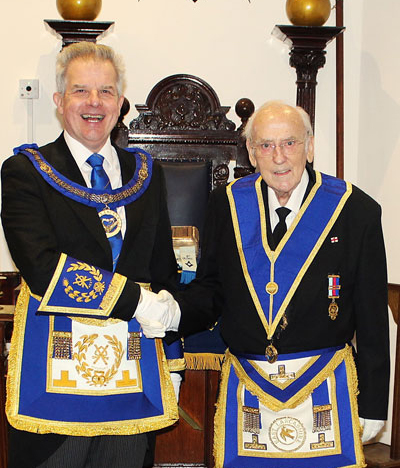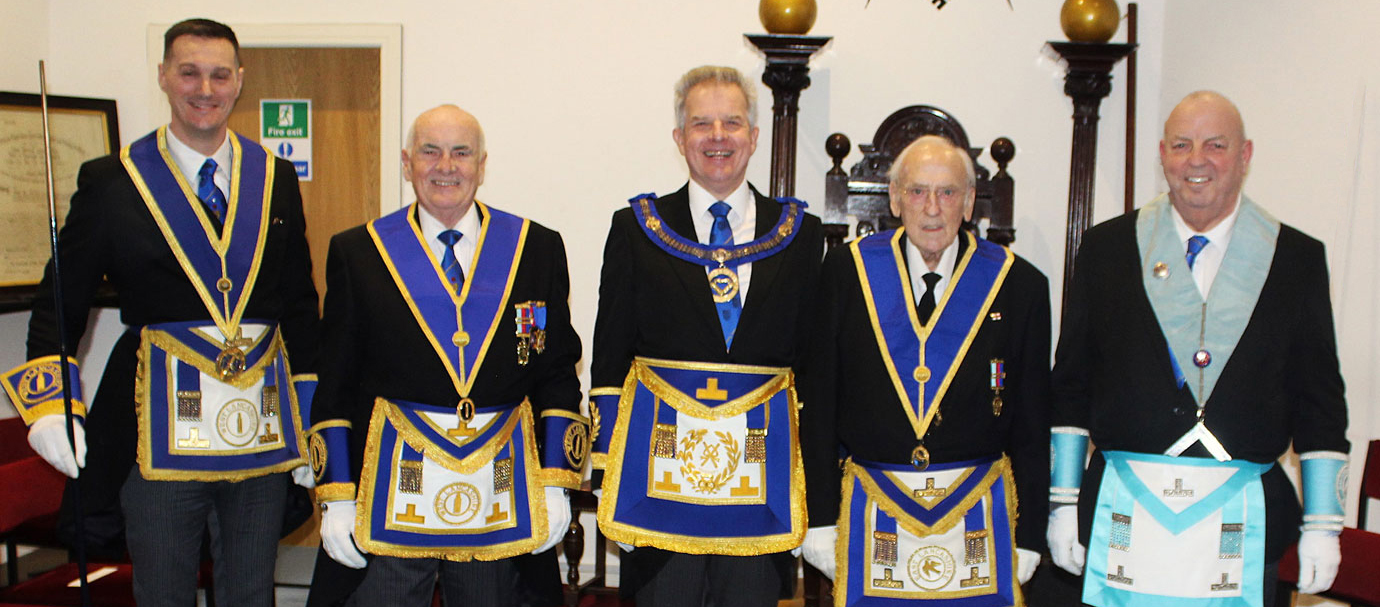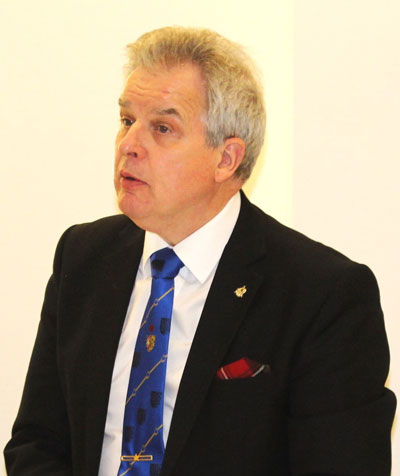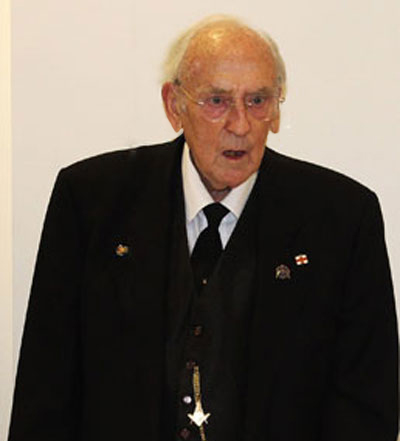A grand occasion was arranged to honour Wilf Knight who was celebrating 50 years of being a Freemason. Members and distinguished visitors alike of Davyhulme Lodge No 3715, meeting at Urmston Masonic Hall, were delighted to receive Assistant Provincial Grand Master Stuart Boyd, accompanied by Trafford Group Chairman Patrick Walsh along with Provincial Deputy Grand Director of Ceremonies Ryan Modlin and other distinguished visitors and group officers.

The lodge business being efficiently dealt with by WM Paul Brown, the special part of the evening arrived as Stuart entered the lodge room in ceremonial form and was presented to Paul. Paul, having welcomed Stuart and his attending officers, hopefully offered him the gavel of the lodge which on this occasion, and to Paul’s relief, Stuart accepted, also taking the master’s Chair. Stuart then addressed the brethren, thanking the lodge for their very kind welcome and explaining what a great pleasure it was to be with the members and visitors of the lodge to share this very unique and auspicious occasion.
Having ensured that Wilf was comfortably seated in prime position, Stuart began his presentation stating that his office of Assistant Provincial Grand Master carried a number of onerous responsibilities and duties, but also a number of great privileges, and the prospect of being able to officiate at a 50th celebration was, without doubt amongst the better ones. Stuart then continued quoting information which Wilf had provided during a convivial time that the two had spent together the previously.
Wilf was born in October 1942 at home, 63 New Moss Road Cadishead, to his father Josia an engine driver at Lancashire Steel in Irlam, moving heavy metals around the site and his mother Violet a cook. Wilf was the second of three children, having an older sister Carol and to be followed by his brother Alan.
He was not evacuated, but stayed in Cadishead throughout the war and whilst he doesn’t remember his family running to the Anderson Shelter at the bottom of their garden during the air raids on industrial Manchester, he does recall his mother taking him potato picking during the war and him riding atop the tractor whilst she did so.
An enjoyable childhood for Wilf was enhanced by the fact that the road where he wase born led onto farmland where lettuce and celery were grown and any spare time he had was spent playing on the farm with his friends, one of whom was the farmer’s son, and driving the farm tractor round the yard.
It was also at this time that a keen interest in cycling took hold of him. He mentioned how he and his friends cycled from dawn until dusk. As a result of this, Wilf remained a keen cyclist for many years which included on one occasion, he and his friend Norman Ramsay cycling to London in two and a half days. His preparation for this trip was extensive and he made sure they both went fully kitted out, with, as his wife Sybil said: “A tin of beans and a tent.”
As was often the case at that time, he left school at 15 to take a job as an office boy at Lancashire Steel in the Blast Furnace Department. However, despite this new employment status, he still met with his friends in the farmland and he mentioned, with a twinkle in his eye, that at 16 when his friend’s dad, the farmer, was away, he used to borrow his car and he and his friends used it to drive to the local pub for a half pint and then drive the car back again.

His main job at Lancashire Steel was to take messages to and from the Plant Manager and he would always take the long way back to study the machines and the steel making process to improve his knowledge and experience. This was the beginning of an inquisitive nature coupled with a solid work ethic that has stood him in great stead throughout his life. The first bonus from his taking the long way back was that at that 16 he secured an apprenticeship, which involved weekly attendances at Leigh College, studying and completing his City and Guilds in Pipe Fabrication over a five-year study programme. The course was a great motivation for him which led to him being awarded the coveted title of ‘Apprentice of the Year’. His proficiency in this also led him to become an Associate Member of the Welding Institute.
On leaving Lancashire Steel, his thirst for knowledge and wish to acquire new skills such as cutting and welding using oxyacetylene equipment, took him to several smaller firms and this enhanced expertise eventually rewarded him with a position at AEI in Trafford Park.
This included him welding electrical turbines and he progressed to the Research Welding Department for his first ‘specialist’ role where he tested the metal to ensure it was to the correct specification. His skills continued to be apparent and he forged ahead, moving to the Heavy Fabrication Section after just three years and ultimately, on to scientific equipment where he was involved in vacuum equipment for mass spectrometers and electron microscopes.

By 1969 he had progressed towards heavy Industry, working for Cripps and looking after a range of contractors who specialised in digging and earth moving equipment. This involved him visiting customers in what was a varied but often pressurised job, as they were hiring the equipment and he was called out if it broke down, with the main task of getting the equipment back up and running as soon as possible after he arrived.
This could be no better illustrated than when tasked with repairing a digging machine at the then new Mersey Tunnel. On arrival he was met with the request of: “Fix it and get me back on the road and he can do what he like for the rest of the day.” Wilf recalled how this motivated him greatly and after completing the job he left in record time with the additional reward of a box of contraband cigarettes on his passenger seat. After this, following a brief change of jobs, Wilf took the opportunity to retire.
Following his retirement, Wilf maintained a keen interest in training and supporting the gift of knowledge which originally came from being an Apprentice of the Year. The roles he has had during this retirement include working for three years at the Runcorn and Trafford Park Skill Centres where he supported young people as a Programme Assessor for Training Schemes and working in the Job Centre for two years supporting people to get into work.
He recalled how this Job Centre role was often a challenging one when, in one example, one applicant came in stating that he wanted to be a window cleaner and were there any funds available for him to purchase equipment to launch his business and get him on the next rung of the business ladder. On outlining that he did not qualify for funding, he thanked him and left. He was than tapped on his shoulder by a colleague who asked what the chap had been in for as she had known him for years as he was her regular window cleaner.
From being the ‘office boy’ he has never stopped being inquisitive, championing the benefits of education and that has always included taking further qualifications himself. In one case he took his PSV licence and became a coach driver for his friends coach business. We chatted about how he would work the summer taking day trippers to Blackpool and to other destinations for longer holidays including the Edinburgh Tattoo and Eastbourne. In this part of his retirement career, he described himself as a coach driver in the summer and a professional layabout in the winter.

His constant community involvement and willingness to do good works has always been clear to see and he also took a job for two years driving a minibus style ambulance, escorting residents to day centres and local hospitals. Whilst still finding time to assist the local scouts maintaining their premises and its surrounds.
Travelling this life’s journey with him has been his wife, Sybil. They met on Valentine’s Day 1962 at a dance at the Social Hall at Lancashire Steel and were married on 6 June 1964. They have a daughter, Elizabeth who lives in Worsley, two grandchildren and one great grandchild.
Whilst mobility issues have restricted his travelling recently, he is still in touch with his Target Rifle Club and takes every opportunity to practice his metalworking skills in his cellar workshop, working on clocks and as he said: “Fixing things and keeping himself busy.” He has also helped a friend out by modifying a silencer for his pistol.
Masonically, after working with known Freemasons in Runcorn he was proposed by Sybil’s uncle, Harold North and seconded by Harold Barbour into Wolseley Lodge No 1993 in the Province of East Lancashire on 9 December 1974. Wilf became WM of the lodge in 1983 and 1993 and in recognition of this he was appointed PPAGDC in East Lancashire in 1992 and promoted to PPJGD in 2003. He was also a member of Domville Lodge No 4647 in the Province of Cheshire for seven years.
In the Province of West Lancashire, he joined Social Lodge No 3472 in 1988, resigning in 1999 after which he became a founder member of Radio Millenium Lodge No 9709. He served as both junior and senior warden in Radio Millenium Lodge and as WM from 2005 to 2007. In addition to his Craft Masonry, he was also a member of Urmston Chapter No 1730 for over 20 years being first principal in 1993. He then joined Davyhulme Lodge in November 2019 and is currently in his third year as assistant secretary.
Following the ceremony, the brethren retired to the social board, at which Stuart Boyd rose adding his congratulations to those of the Provincial Grand Master Mark Matthews.
Wilf, clearly moved, then responded to this giving his thanks to all who had helped him over the years and particularly to the members of Davyhulme Lodge, thus completing a fascinating and well-deserved evening and a friendly and convivial social board!


